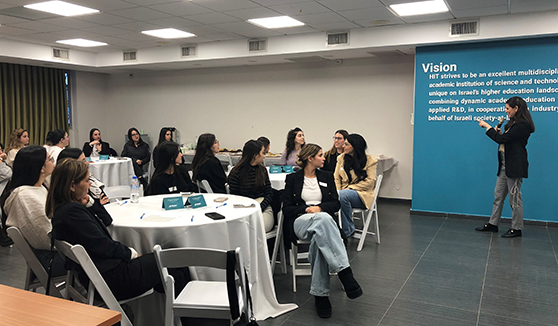More:
M.Sc. in Electrical and Electronics Engineering
M.Sc. in Electrical and Electronics Engineering
(without a thesis, or with a thesis)
Prof. Yosef Ben Ezra, Dean & Head of the Masters Department with a thesis
Dr. Boris Lembrikov, Head of the Masters Department without a thesis
The Faculty offers 5 tracks:
-
Microelectronics and Nano-technologies Track
Head of track: Dr. Alexander Axelevitch
-
The mission of the track is to prepare the students for the technology challenges in the field, equipping them with a strong background in all theoretical and practical aspects of micro and nano-electronics. The curriculum includes mandatory courses and laboratories in electronic devices, microelectronic technologies, thin-film technology, and thin-film and micro-electronics laboratories. Optional courses cover topics like biomedical sensors.
-
Energy and Power Systems Track
Head of track: Dr. Meir Arbel
-
Is designed for students wishing to specialize in the energy field. It offers advanced courses in various aspects of energy including power systems, power electronics, lightning protection, renewable energy, and other theoretical and practical courses. The program is supervised by the Faculty’s Director of Master's programs.
-
The Communication Engineering Track
Head of track: Prof. Uri Mahlab
-
Students are provided with advanced technical knowledge in the fields of RF communications, RFIC, optical communications, DSP and advanced topics in digital communication.
The current program consists of mandatory courses in mathematics, communication theory, optical communications, RF communication systems, RFIC (Radio Frequency Integrated Circuits), and DSP. The elective courses offered are usually an extension of the mandatory courses.
-
Electro-Optics and Image Processing Track
Head of track: Prof. Boris Apter
-
Offers studies on a range of topics from electro-optic devices (lasers, modulators, receivers, amplifiers, optical fibers etc.) up to the system level. Special emphasis is placed on image processing as it has a close synergy with electro-optical systems in fields such as medicine, biometrics, and defense. This ensures that the track provides a holistic approach to these important fields.
-
Bioconvergence Track NEW!
Head of track: Dr. Yuval Dorfan
Bioconvergence is an innovative and groundbreaking branch of applied science, which is today at the forefront of global research, generating new industries worth billions of dollars and should provide major scientific-technological breakthroughs in the 21st century.
Bioconvergence combines tools from biological engineering with existing tools from classical engineering (electronics, materials engineering and more). Through biological engineering, it enables new applications and solving difficult problems in a variety of industrial fields, far beyond health and food.
The purpose of the M.Sc. (with thesis) specialty track at Bio Convergence at the Faculty of Engineering is to allow students to acquire knowledge and be exposed to the interdisciplinary research and technology that is at the forefront of science and technology, while training them to successfully deal with the new engineering and industrial challenges expected in these fields in the coming years.
- News & Events



